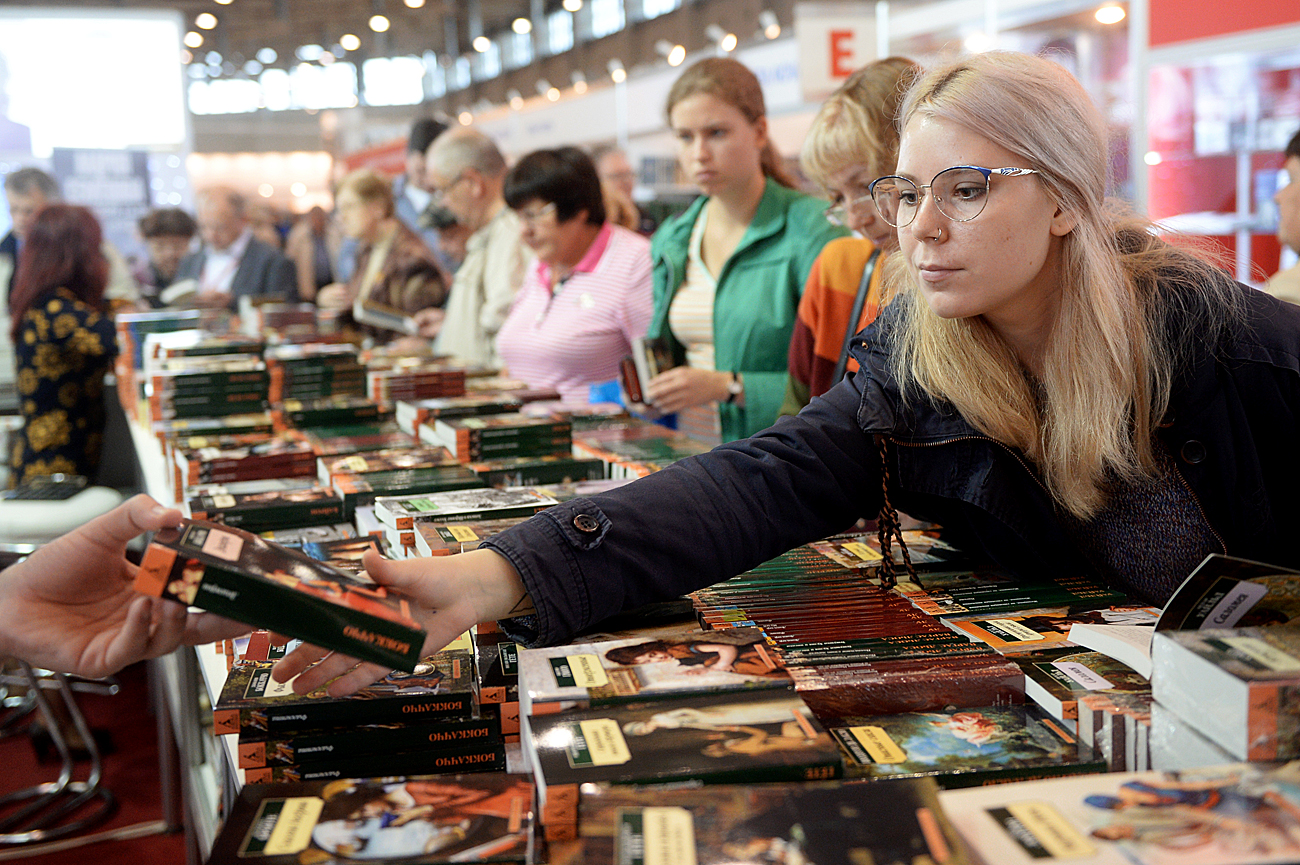
Visitors of the 28th Moscow International Book Fair at VDNKh.
Kirill Kallinikov/RIA NovostiAt the end of August, the Russian Book Chamber released its rating of the most popular authors, while Rospechat, the Federal Agency for Press and Mass Communications, published its annual report on the state of the Russian publishing market. By all accounts, popular literature is in the lead.
According to the Russian Book Chamber, the country’s most published author is Darya Dontsova, a writer who has penned an impressive number of crime fiction novels. Her books are released straight to paperback and are described by literary critics as ‘disposable’ holiday reading material. Yet their print runs are remarkable. Each year, Darya Dontsova pens several new novels, all of which fly off the shelves. In 2015 alone, there were 1,968,000 copies of her books printed. In 2016, she remains the most prolific writer, too, with 74 books to her name.
The second and third places on the list of Russia’s most published authors belong to two more crime fiction writers: Tatyana Ustinova (41 books) and Tatyana Polyakova (40 books), respectively.
The 2015 list of bestseller titles was slightly different. According to the Rospechat report, the country’s best-selling books were historical detective stories by Boris Akunin, Tatyana Ustinova and another crime fiction author, Alexandra Marinina.
In the children’s literature section of the Rospechat report, the leaders in terms of sales were Nadezhda Zhukova’s Alphabet Book for children learning to read, followed by J.K. Rowling’s Harry Potter and the Philosopher’s Stone.
The most published children’s author, according to the Book Chamber rating, is the Soviet poet Korney Chukovsky, with 76 of his books published in the first half of 2016. The second and third places on the rating belong to another Soviet children’s poet Agnia Barto (47 books) and Hans Christian Andersen (24 books), respectively.Commenting on the rating, author and literary critic for the Nezavisimaya Gazeta daily Alisa Ganieva welcomes “the presence of Korney Chukovsky, whose popularity has withstood Soviet-era directives, perestroika, and even new exciting offerings from trendy contemporary authors.”
As for the rest, Ganieva is not surprised by readers’ choices. “Naturally, mass-circulation popular literature and female crime fiction authors are in the lead. First, they are already recognizable brands in Russia and, second, they are very prolific,” the expert explains.
Oxana Grunchenko, a research associate with the Vinogradov Institute of Russian Language, points out that one should differentiate between tastes and sales figures, not least because the titles that sell best are cheap books that are easily thrown out once they have been read. “The choice of a book may depend on the publisher's clever marketing policy rather than on the artistic merits of the text itself,” she adds.
Predictably, Grunchenko continues, bestseller lists will be topped by fiction, be it crime or romance, which “does not require intellectual effort on the reader’s part.” Readership of other type of literature will always be considerably smaller and sales lower, she adds.
“Besides, Pushkin, Chekhov, Tolstoy and Dostoyevsky can be read and reread again and again, but there is no need to buy them again and again. That is why I am not at all surprised that Russian classical authors are missing from the relevant section of the ratings.”
Ganieva insists that the main thing is that people continue to read books. Demand for serious literature is also on the rise, although it has not yet made it into the big ratings. “It would be interesting to know the latest non-fiction rating since it is there that the intellectual center of gravity has shifted,” the critic points out. “I think the top 10 titles in that rating will include not only manuals on ‘how to become rich in 10 days’ or ‘how to marry a prince’.”
Indeed, according to the Rospechat report, the 2015 list of top 10 non-fiction bestsellers included journalist Mikhail Zygar’s All the Kremlin’s Men: A Brief History of Contemporary Russia, Boris Akunin’s History of the Russian State: Between Asia and Europe – From Ivan III to Boris Godunov, and Ayn Rand’s Atlas Shrugged.
“Interest in reading is growing; moreover, it is growing not in the popular but in the serious segment,” says Boris Kupriyanov, publisher and owner of the Falanster intellectual bookstore. “Far from destroying the market, the [economic] crisis has in fact helped it. Books are one of the few things that add joy to our everyday life without costing that much. People now read more than they did three years ago. People have started going to libraries again, which is a completely new thing. They also borrow books from their friends.”
All rights reserved by Rossiyskaya Gazeta.
Subscribe
to our newsletter!
Get the week's best stories straight to your inbox